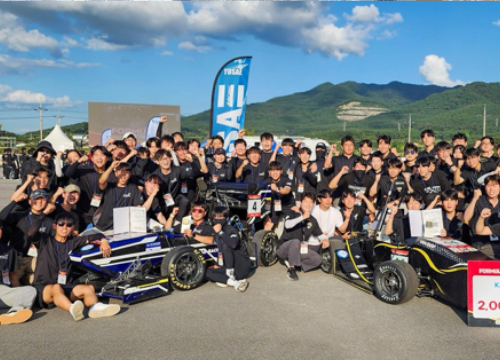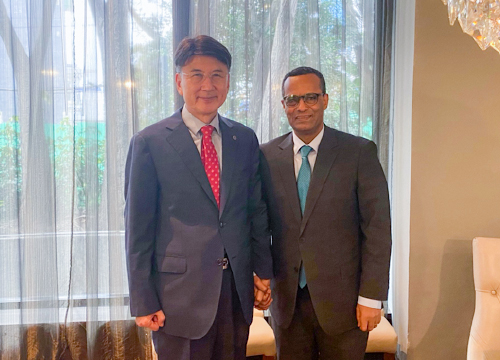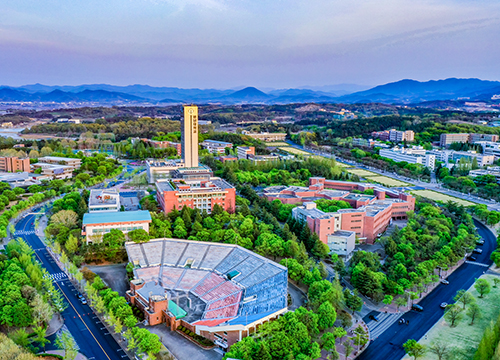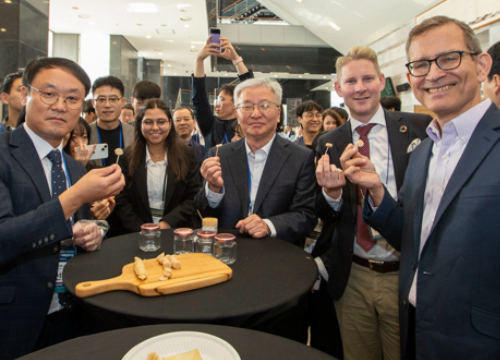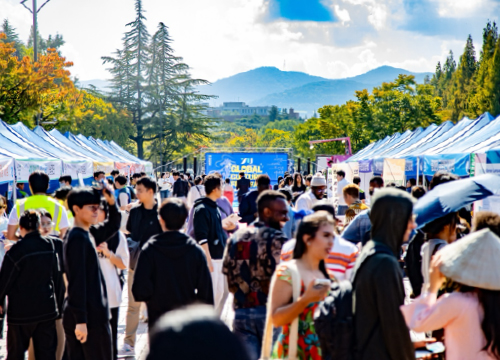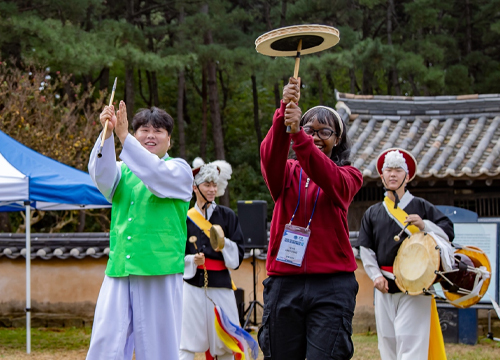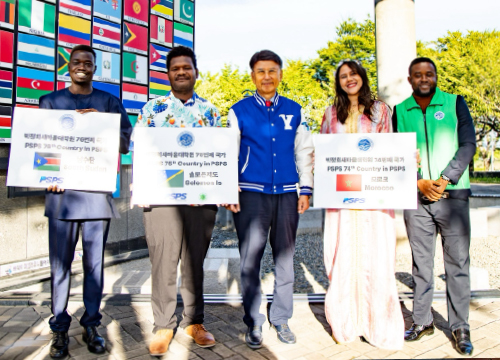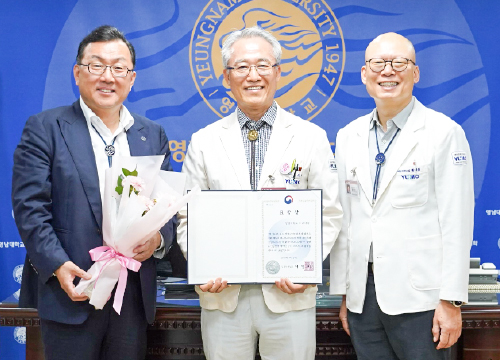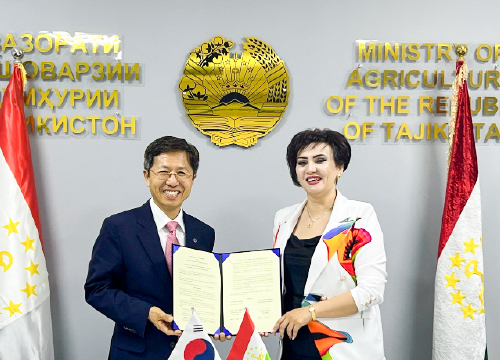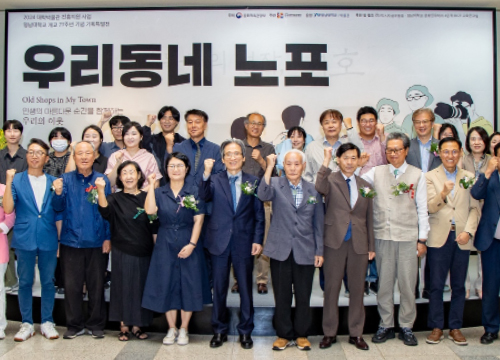-
YUSAE Student Auto Club Takes Gold in Formula Division Cheonma DM Team Earns Silver in Formula EV Division, Demonstrating Exceptional Skill Students Design and Build Cars Using Classroom Knowledge [October 30, 2024] <YU’s student auto club members who excelled in the 2024 Student Formula Competition> Students from YU’s student auto club showcased their talent by winning two major awards at the 2024 Student Formula Competition. The spotlight was on YU’s student auto clubs ‘YUSAE’ (mentored by Professors JUNG Young-hoon and KANG Seok-won from the School of Future Automotive Engineering) and ‘Cheonma DM’ (mentored by Professor YOO Gi-soo from the School of Mechanical Engineering). The YUSAE team clinched the gold in the Formula Division, while the Cheonma DM team took silver in the Formula EV Division, validating their skills honed through rigorous preparation. < YU’s YUSAE team’s Formula car racing on the track> Jointly organized by the Korean Society of Automotive Engineers and the Korea Automotive Technology Institute, the competition took place over three days from September 27 to 29 at the E-Mobility Research Center in Yeonggwang, Jeollanam-do. Now in its 18th year since its 2007 launch, this year’s event saw participation from 54 teams representing 40 universities across Korea and two international universities, all competing with vehicles they designed and built themselves. In the Formula Division, teams advanced through vehicle and safety inspections (covering noise, rain, brake, and tilt tests), and were evaluated in acceleration, skid pad, autocross-gymkhana, and endurance racing. YU’s YUSAE and Cheonma DM teams continue to distinguish themselves in the student automotive arena, having achieved top honors in previous competitions, including the International Student Formula Competition hosted at YU. <Team YUSAE (left), winner of the gold medal in the Formula category, and Team Cheonma DM (right), winner of the silver medal in the Formula EV category> YUSAE team leader LEE Jae-hyun (4th-year, School of Future Automotive Engineering) expressed his excitement, stating, “Although the preparation period was challenging, I am thrilled to have competed against other university teams with a car we designed and built from scratch based on our classroom learning. We’ll aim to create an even better vehicle to achieve great results in next year’s competition.” Professor JUNG Young-hoon from YU’s School of Future Automotive Engineering remarked, “The students gained invaluable experience from designing to manufacturing their own car and driving it on the track. Competing in the event helped them apply theoretical knowledge practically, a significant experience that will serve them well in their careers.”
- PR team
- 2024. 11. 07
- 2024. 10. 30
- 1841
-
YU President CHOI Oe-chool Pledges Saemaul Studies Partnership with Addis Ababa University Ethiopian Deputy Minister of Education Recommends Expanding Saemaul Studies to Additional Universities Federal Civil Service Commissioner of Ethiopia Invites President CHOI Oe-chool to Civil Service Innovation Workshop Contributing to Korean National Image and Global Trust in Korean Products Through Public Diplomacy [November 1, 2024] <MOU Signing Ceremony with Addis Ababa University (YU President CHOI Oe-chool on the right)> YU President Choi Oe-chool recently visited Ethiopia and signed a memorandum of understanding (MOU) with Addis Ababa University (President Samuel), solidifying a commitment to share insights from Korea’s Saemaul Undong (New Village Movement) for rural development. The partnership aims to cultivate Saemaul experts in Ethiopia through higher education by sharing the principles, key factors of success, and values behind Korea’s transformative movement. The signing ceremony was attended by the Counselor of the Korean Embassy in Ethiopia, who expressed support for the collaboration's progress. As part of the MOU, YU will work with Addis Ababa University’s College of Development to establish a Saemaul Studies program, alongside a Saemaul Movement Center to conduct research and training focused on local adaptation of Saemaul principles. President CHOI stated, “Ethiopia is a ‘brother nation’ that sacrificed for Korea’s freedom over 70 years ago, and I believe that Koreans hold a historic responsibility to give back. Through academic exchange of Saemaul Undong, YU is striving to fulfill this duty. The fact that Haile Selassie, Emperor of Ethiopia and the founder of Addis Ababa University, deployed his elite Imperial Guard during the Korean War makes today’s signing even more meaningful.” <From left, President CHOI Oe-chool with Deputy Minister of Education, Kora Tushune Godana> < YU Delegation with Deputy Minister Kora Tushune Godana of Ethiopia’s Ministry of Education> The Ethiopian government, recognizing YU’s efforts, has pledged strong support for this collaboration. During an October 14 meeting with YU President CHOI, Deputy Minister of Education Kora Tushune Godana stated, “The success of the Saemaul Movement lies in transforming mindsets, which aligns well with our goals for higher education reform in Ethiopia. I hope YU can extend Saemaul training to other key universities that we will recommend.” <From left, President CHOI with Commissioner Mecuria Haile of the Federal Civil Service Commission> <Commissioner Mecuria Haile meets with President CHOI to discuss sharing Saemaul Undong principles.> Earlier, on the morning of October 14, Mecuria Haile, Commissioner of the Ethiopian Federal Civil Service Commission, met with President CHOI to request Saemaul Undong insights for public service innovation. A KAIST-educated scholar and chairman of the Korea-Ethiopia Friendship Association, Commissioner Haile expressed his ongoing commitment to promoting Saemaul ideals in Ethiopia, recalling a promise he made upon his return to Ethiopia after completing his studies in Korea. “I am currently responsible for innovating the civil service at both central and local levels. I would like to invite you to an upcoming civil service innovation workshop to share the core principles and spirit of Saemaul with our officials,” he said, adding that Ethiopia’s government would fully cover the associated costs. In response to these requests, President CHOI stated, “I understand that YU’s Institute for International Development Cooperation (IIDC) is set to conduct a training program for senior Ethiopian officials and university leaders at the end of October. We will make every effort to share YU’s Saemaul experiences with sincerity.” He went on to explain the key factors behind the success of Saemaul Undong, as well as the challenges, and provided specific insights on talent development and utilization. YU has led efforts to share Saemaul Studies internationally, establishing a Department of Saemaul Economic Development at Enderun College in the Philippines in 2015, followed by similar programs at Western University in Cambodia and Samarkand State University in Uzbekistan. Starting this September, YU also launched a Sustainable Saemaul Forestry Studies program at Werabe University in Ethiopia. Moreover, YU has recently received requests from more than ten countries, including Cambodia’s Royal University and Guinea’s National University, to support the establishment of Saemaul Studies departments and research centers. YU’s commitment to promoting Saemaul Studies globally is expected to enhance Korea’s international image and strengthen trust in Korean products as part of public diplomacy efforts.
- PR team
- 2024. 11. 07
- 2024. 11. 01
- 1827
-
Jump of 169 Places in Global Rankings Among 2,250 Universities Worldwide Recognized by Prestigious Global Ranking Agencies for Research Impact and International Collaboration Increased Performance in Citation Impact, Papers per Citation, and International Co-authored Papers [October 14, 2024] University Korea Rank Asia Rank World Rank Seoul National Univ. 1 23 135 YU Univ. 2 42 205 Sejong Univ. 3 50 241 Sungkyunkwan Univ. 4 58 275 KAIST 5 65 296 Korea Univ. 6 67 300 POSTECH 7 92 385 UNIST 8 94 391 Hanyang Univ. 9 105 445 Kyunghee Univ. 10 128 516 Kyungpook National Univ. 11 199 698 Pusan National Univ. 12 205 718 YU 13 216 743 Univ. of Ulsan 14 216 743 Dongguk Univ. 15 281 900 Ewha Womans Univ. 16 282 902 Univ. of Seoul 17 283 913 Chonbuk National Univ. 18 288 921 Chonnam National Univ. 19 297 946 Chung-Ang Univ. 20 334 1049 <2024 Global University Rankings by U.S. News & World Report> Yeungnam University (President Choi Oe-chool) has risen to 13th place in Korea according to the 2024-2025 Best Global Universities Rankings by U.S. News & World Report, a significant jump from last year's 18th place. U.S. News & World Report, an American weekly known for its education, politics, and economics coverage, has been evaluating U.S. universities since 1983 and began global university rankings in 2014. Recently, the 'U.S. News & World Report' announced the rankings of universities worldwide up to 2,250th place. YU surged 5 places in the national rankings to 13th, with a notable climb to 216th in Asia and 743rd globally (compared to 2022’s 18th in Korea, 244th in Asia, and 912th globally). The U.S. News & World Report university rankings evaluate 13 categories, including research reputation, the number of publications, citations per paper, the percentage of highly cited papers, and the number of internationally co-authored publications. YU showed outstanding improvement in several indicators: it climbed 184 spots globally to rank 86th in international collaboration, rose 395 places in the proportion of papers in the top 10% of citations, advanced 128 places in citations per paper, and improved by 28 spots in the number of publications. Earlier, in the 2024 Leiden Ranking, YU made its first entry into the top 5 nationwide, with notable success in the Mathematics & Computer Science field, where it ranked 1st in Korea (131st globally, 39th in Asia) for the 10th consecutive year, demonstrating world-class research capabilities. Particularly noteworthy is YU's remarkable rise in the field of Life and Earth Sciences, achieving 365th globally, 72nd in Asia, and 2nd in Korea (compared to last year's 839th globally, 251st in Asia, and 9th in Korea), astonishing the academic community. Additionally, the Natural Sciences and Engineering field also improved from 17th to 11th place, further acknowledging YU's research excellence. Leiden Ranking evaluates ranking of world universities based on qualitative levels of theses to show research power. President CHOI Oe-chool of YU commented, "The continued recognition of Yeungnam University's education and research standards by globally respected university ranking agencies highlights our capabilities and global competitiveness. We will continue to support the pursuit of world-class education and research in all academic fields."
- PR team
- 2024. 10. 24
- 2024. 10. 14
- 2605
-
On the 7th and 8th, cell culture and cultivated meat experts gathered at YU to share the latest technologies and industrialization trends. Under the theme of "Latest Trends in Cell Culture Technology and Applied Industries," major companies showed great interest with 'participation from 100 companies.' A total of around 1,000 participants from academia, industry, government, and local municipalities attended the 'largest cultivated meat symposium in Korea.' [October 8, 2024] Yeungnam University (President CHOI Oe-chool) successfully concluded the "2024 International Symposium on Cell Culture," the largest symposium of its kind in Korea, focusing on cell culture and cultured meat. The symposium was co-organized by YU’s Institute for Cell Culture (Director: Prof. CHOI In-ho, Department of Medical Biotechnology), the Korean Society of Food and Nutrition Science, and the Korean Society of Food Hygiene and Safety, and was supported by Gyeongsangbuk-do and Uiseong-gun. The event drew over 1,000 participants, including representatives from 41 universities, 31 government agencies and institutions, and more than 100 companies. <Prof. CHOI In-ho, Director of YU’s Institute for Cell Culture, delivering an opening speech.> <YU’s Vice President for Industry-Academia Cooperation, LEE Kyung-soo, giving a congratulatory speech.> Held under the theme “Trends in Advanced Cell Culture Technologies and Industrial Applications,” the symposium attracted over 200 industry professionals from 100 leading companies, including Samsung Bioepis, Celltrion, Hanwha Solutions, Lotte Chemical, SK Bioscience, Daesang, CJ, Ottogi, Sempio Foods, Pulmuone, and Ildong Foodis, demonstrating significant interest from the industry. The symposium featured three key sessions: ▲Cutting-edge Theories and Technologies in Cell Culture, ▲Research and Industry Trends in Cultured Meat, and ▲Industrialization Strategies for Natural Products: Merging In Silico Technologies with Cell Culture. On the first day (October 7), KO Han-seung, President of the Korea Bio Association, delivered the keynote lecture on “The Importance of Cell Culture Technology and the Need for Regional Infrastructure Development.” Following the keynote, there were presentations and discussions on topics such as ▲Methods for Structuring Cultured Meat ▲The Current Status and Future of Organoid Technology Commercialization ▲Developing Pharmaceutical and Functional Food Materials for Treating Chronic Inflammatory Diseases Using Natural Products. On the second day (October 8), Bruce Friedrich, President of The Good Food Institute, a global nonprofit organization, gave a keynote lecture titled “The Next Agricultural Revolution,” which explored sustainable food production through biotechnology. Further sessions followed, covering topics like ▲Developing Bio-technology for Sustainable Future Food Production ▲Cell Culture Processes for Producing High-Quality Antibody Pharmaceuticals ▲Accelerating New Drug Development Using Artificial Intelligence. A cultured meat-tasting event, held at the Cheonma Art Center Grand Hall lobby, also garnered considerable attention. Attendees sampled cultured meat made from chicken muscle stem cells, a project co-hosted by Prof. CHOI In-ho and Prof. HUH Sun-jin from Chung-Ang University, who is conducting joint research with the Ministry of Agriculture, Food, and Rural Affairs’ High-Value Food Technology Development Project. <Participants show great interest in the cultured meat tasting event, where chicken muscle stem cell-derived meat was showcased at the Cell Culture International Symposium.> Traditionally, the "meat" humans consume consists primarily of skeletal muscle attached to bones. The flavor of meat is determined not only by the muscle itself but also by the surrounding tissues, including fat, blood vessels, nerves, and connective tissues. Recently, the use of cell culture technology combined with muscle stem cells to produce so-called "cultured meat" has sparked significant interest from both the industry and academia, as well as governmental organizations around the world. The key to cultured meat production lies in how effectively muscle stem cells can be cultured to replicate the structure of real meat. Prof. CHOI In-ho (Department of Medical Biotechnology), a leading authority in muscle stem cells and cell culture, has been at the forefront of YU’s Institute for Cell Culture since its establishment in 2017. Prof. CHOI began conceptualizing the "Cell Culture Industrialization Hub Center" project in 2014 with support from Gyeongsangbuk-do and Uiseong-gun. The institute, officially opened in 2017, came into being through the combined efforts of several YU professors who had participated in the project. YU’s Institute for Cell Culture has been recognized for its achievements in research and collaboration with local governments and industries. Since 2020, the institute has been selected for three major government-funded projects: the Ministry of Education’s "University Key Research Institute Support Program in Science and Engineering," the "K-U City Project Pilot Program" in 2023, and the "In Silico Commercialization Infrastructure Project" in 2024. The institute has also played a pivotal role in establishing the Gyeongbuk Cell Culture Industry Support Center in Uiseong-gun, where a branch of YU’s Institute for Cell Culture is located. This center supports research and development in in silico technologies and trains specialized personnel for the cell culture industry. These efforts have positioned YU’s Institute for Cell Culture as a model university-affiliated research center. The academic and industrial communities' heightened interest in YU’s cultured meat symposium underscores the university's leadership in the field. Prof. CHOI In-ho, who organized the symposium, remarked, “Experts from around the world presented on a variety of topics related to cell culture, and the participation of over 100 industry professionals reflects the high level of interest in this field. With national investment and collaboration among academia, industry, government, and research institutions, we hope to further enhance our technological capabilities in cell culture. I believe this international symposium will play a crucial role in positioning Korea as a global leader in the cell culture field.”
- PR team
- 2024. 10. 24
- 2024. 10. 08
- 2553
-
International and Korean Students Unite to Overcome Cultural and Language Barriers Traditional Costumes and Foods from Various Countries Featured, with Opportunities to Experience and Enjoy the Festival Flea Market Held with Donated Items from University Members; Proceeds Donated to Charity [October 16, 2024] Yeungnam University (President CHOI Oe-chool) hosted the ‘YU Global Culture Festival.’ Organized by YU's International Admissions Support Team and the Daegu-Gyeongbuk Environmental Headquarters of the Korea Environment Corporation, the event was designed to introduce the diverse cultures of international students studying at YU. The festival aimed to foster a sense of global community among young people who will lead the world in the future. Held on October 11 around YU’s Cheonmajimun, the event saw over 1,000 participants, including members of the International Student Association, composed of students from countries such as China, Vietnam, Mongolia, and Uzbekistan, as well as students from 28 countries attending the Park Chung Hee School of Policy and Saemaul (PSPS), hailing from Ghana, Cambodia, Kenya, Uganda, and more. Local public institutions and organizations such as the Korea Environment Corporation and the Daegu Beauty Export Association were also in attendance. International students set up booths along Cheonma Street, where they showcased their home countries’ cultures and offered opportunities to experience traditional clothing and cuisine, drawing much attention from participants. Additionally, a flea market was held, featuring items donated by students, faculty, and staff, with all proceeds going to YU’s Social Contribution Group. Participants could also enjoy K-Beauty and upcycling experiences, receive admissions counseling for the Graduate School, PSPS, and the Korean Language Institute, and consult on employment and visa matters, which received a positive response from international students. Ceesay David Alusine, a student from Sierra Leone, said, "It was a great experience to wear traditional costumes and try different foods with many international and Korean students. I look forward to making more memories and experiencing diverse cultures during my time studying abroad." LEE Chun-young, Director of the International Admissions Support Team and professor of Chinese Language and Culture at YU, who organized the event, remarked, “This festival served as an opportunity for international and Korean students to come together, understand each other's cultures, and communicate. We will continue to support international students at YU, ensuring that they not only succeed academically but also have a variety of enriching experiences.”
- PR team
- 2024. 10. 24
- 2024. 10. 16
- 1869
-
Cultural Experience Festival Held for International Students Speech Topics Include “The Happiest Moment in My Life” and “My Life in Korea” Students Enjoy Traditional Korean Games like Tuho Throwing Alongside Performances of Traditional Dances and Songs from Various Countries [October 18, 2024] Yeungnam University (President CHOI Oe-chool) hosted the ‘2024 Saemaul Spirit Korean Speech Contest & Global Saemauler Festival.’ The event, organized by YU’s PSPS, was a global cultural festival aimed at enhancing international students’ understanding of Korean language and traditional culture. It also sought to foster a sense of belonging and solidarity among the participants through the sharing of Korean traditions. The festival was attended by more than 100 participants, including 68 students from the PSPS, members of the Saemaul Club at YU, and university faculty and staff. The Korean speech contest, held on the morning of October 18 at the YU Folk Village, saw 15 international students from six countries, including Indonesia, Uzbekistan, and Nigeria, delivering speeches. The speech topics were “What the Park Chung Hee School of Policy and Saemaul Means to Me,” “My Life in Korea,” and “The Happiest Moment in My Life.” <Winners of the Saemaul Spirit Korean Speech Contest> The top prize went to Haqiqi Lulu Firdausi from Indonesia, who spoke on the topic “What the Park Chung Hee School of Policy and Saemaul Means to Me.” She said, “I am happy that my Korean language skills have improved while preparing for this speech contest. More than the ranking, the experience of participating in this contest allowed me to learn more about Korea. I also look forward to enjoying more traditional Korean games and making memories with my friends.” <PSPS students enjoy Korean traditional culture, Samulnori performance> In the afternoon, the ‘Global Saemauler Festival’ took place, where over 100 participants, including students and professors from the PSPS, and members of the YU Saemaul Club, enjoyed traditional Korean games such as tuho (arrow throwing), jegichagi (Korean shuttlecock kicking), rolling hoops, and arm wrestling.Students from various countries also performed their traditional dances and songs, wearing their national attire in a fashion show, sharing and experiencing each other's cultures. Dean of PSPS, LEE Byung-wan, who organized the event, said, “By presenting in Korean, international students not only practiced their Korean language skills but also deepened their understanding of Korean culture. We hope that the knowledge and skills they have gained here will help them contribute to the development of their own countries and build networks with Korea after they return home.” Founded in 2011, PSPS aims to train Saemaul leaders from developing countries. Unlike regular undergraduate and graduate students, the international students here are mainly government officials, public sector workers, social activists, and professionals who have experience in policy planning and execution in their home countries. These students complete an 18-month master’s program while studying the Korean language. To broaden their experience, YU organizes events like the Korean speech contest and cultural immersion programs. Currently, the school hosts 68 students from 23 countries, including Cambodia, Indonesia, Rwanda, Ethiopia, the Solomon Islands, and South Sudan. To date, 808 students from 69 countries have earned a master’s degree in Saemaul Studies and have gone on to become key policymakers, international development experts, and Saemaul Movement leaders in national governments, public institutions, and international development NGOs worldwide.
- PR team
- 2024. 10. 24
- 2024. 10. 18
- 1857
-
Students from Morocco, Solomon Islands, and South Sudan enroll in YU's Park Chung Hee School of Policy and Saemaul (PSPS). In just over a decade, 938 students from 76 countries have studied Saemaul at YU. Developing countries worldwide turn to YU for its systematic approach to ‘Saemaul Studies.’ [October 4, 2024] (From left to right: Gol student Abraham Dictor Riak, Oihanua Andrew, President CHOI Oe-chool, Elkasri Zada) The growing global interest in Saemaul Studies at YU, led by President CHOI Oe-chool, continues to soar. This year, students from the 74th (Morocco), 75th (Solomon Islands), and 76th (South Sudan) countries have enrolled in the Park Chung Hee School of Policy and Saemaul (PSPS) at YU. They have come to study 'Saemaul Studies' a discipline YU has developed into an academic field. Since its establishment in 2011, PSPS has welcomed students from 76 countries. The school's achievements are extraordinary, as few similar examples exist worldwide. In 2018, a student from Cuba, a country with no formal diplomatic relations with Korea at the time, enrolled in YU, generating significant interest. Students from all over the world, including Africa, South America, and Asia, seek out PSPS at YU to systematically learn from Korea’s development experience and the Saemaul Movement. The recently admitted international students are El Kasri Jada from Morocco (Africa), Oihanua Andrew from the Solomon Islands (Oceania), and Goljok Abraham Dictor Riak from South Sudan (Africa). <PSPS students welcome the 74th, 75th, and 76th international students to YU.> YU has been accumulating educational and research performances and know-how for more than 40 years until now. YU established research institutions and professional education and training centers as well as faculty and graduate school courses such as Park Chung Hee Saemaul Institution, Park Chung Hee School of Policy and Saemaul (PSPS), International Development & Cooperation Center, and Department of Saemaul International Development, academized Saemaul Movement as a sector of studies, and has been implementing various projects in Saemaul International Development area. El Kasri Jada shared his enthusiasm, saying, “The Saemaul Movement played a significant role in helping Korea overcome poverty and become the developed country it is today. I came to YU to study the movement, which laid the foundation for Korea’s economic prosperity. I hope to use my time here to explore development policies for my home country based on the principles of the Saemaul Movement.” President CHOI Oe-chool remarked, “Korea is the only country to have risen from being one of the world’s poorest to a developed country, and the Saemaul Movement played a pivotal role in that transformation. We are committed to sharing the educational and research outcomes of the Saemaul Movement with the world so that it can become a new 'K-policy' and a part of the Korean Wave. We will continue to support students who study and research Saemaul at YU, so they can contribute to their countries' development and the shared prosperity of the global community.” Meanwhile, YU's PSPS was established in November 2011 to train international and regional development experts in Saemaul for government officials, policymakers, and public sector workers from developing countries. To date, the program has educated 938 social leaders from 76 developing nations and produced 808 master's graduates. These graduates now serve as key policymakers, international development experts, and leaders of the Saemaul Movement in government ministries, public institutions, and international NGOs. As of October 2024, 83 international students from 28 countries are currently enrolled.
- PR team
- 2024. 10. 10
- 2024. 10. 04
- 2710
-
Awarded at the '2024 Community Health Survey Conference' on September 24 Recognized as an excellent survey institution for 7 consecutive years, contributing to public health and the healthcare industry Conducting the Community Health Survey as a lead institution since 2008 [October 2, 2024] <From left to right: Professor LEE Kyung-soo, Department of Preventive Medicine, Dean KIM Seong-ho, College of Medicine, Professor HWANG Tae-yoon, Department of Preventive Medicine> YU (President CHOI Oe-chool) has been recognized by the government for its contributions to the advancement of regional healthcare and the improvement of public health. On September 24, YU's College of Medicine received a commendation from the Commissioner of the Korea Disease Control and Prevention Agency (KDCA) at the '2024 Community Health Survey Conference.' The university was honored for its achievements in advancing community health projects, being selected as an outstanding institution for its contributions to the Community Health Survey. The Ministry of Health and Welfare and the KDCA award organizations and institutions that utilize survey results from local health centers to improve national health. Since the Community Health Survey began in 2008, the Department of Preventive Medicine at YU's College of Medicine has been serving as a lead institution, conducting surveys in collaboration with nine local health centers in the Gyeongbuk region. Through systematic training for surveyors and stringent survey management, YU has consistently produced highly reliable regional health statistics, earning recognition as an outstanding institution for the past seven years. As the lead institution for the Gyeongbuk region's Community Health Survey, under the supervision of Professor LEE Kyung-soo from the Department of Preventive Medicine, YU has been responsible for publishing the Gyeongbuk regional health statistics for the past 12 years. This work has helped identify key health issues in the region, provided evidence for health policy development, and contributed to the planning and evaluation of local healthcare projects. Dean KIM Seong-ho of YU's College of Medicine commented, “The Community Health Survey led by the Department of Preventive Medicine is a significant project that has contributed to improving public health by providing long-term regional health statistics through stable surveys and quality management. We hope these statistics will continue to play a crucial role in shaping health policies and plans for our region.”
- PR team
- 2024. 10. 10
- 2024. 10. 02
- 2723
-
Collaborating with government bodies like the Ministry of Agriculture of Tajikistan and the Ministry of Digital Technologies of Uzbekistan Discusses dual-degree programs with Bokhtar State University and Samarkand International University of Technology Initiates 'Educational Silk Road' in Central Asia [September 23, 2024] <YU signs an MOU with the Ministry of Agriculture of Tajikistan to collaborate on agricultural advancement. (From left: YU Vice President KIM Jae-chun, Deputy Minister Nigina Anvari of the Ministry of Agriculture of Tajikistan)> Yeungnam University (President CHOI Oe-chool) is expanding its exchanges with Central Asia. From September 3 to 11, a YU delegation composed of international officials, including YU Vice President for International Education Kim Jae-chun, visited Tajikistan and Uzbekistan.The YU delegation had a busy schedule, visiting government agencies and universities in both countries and signing exchange agreements. During their visit to Tajikistan on September 4, the YU delegation signed an MOU with the Ministry of Agriculture of Tajikistan to promote agricultural advancement through education and technology development. The signing ceremony was attended by the YU delegation and Deputy Minister Nigina Anvari of the Ministry of Agriculture. The agreement includes the following points: With the signing of the agreement, the two organizations pledged to work together to ▲ share Korea's experience in socio-economic development through the Saemaul movement ▲ cooperate between YU and the Ministry of Agriculture of Tajikistan through agricultural technology sharing ▲ conduct knowledge-sharing pilot projects to promote sustainable agriculture and the Saemaul movement ▲ and provide capacity-building training for leaders of the Ministry of Agriculture of Tajikistan. In 2021, YU had already signed an MOU with the Ministry of Industry and New Technologies of Tajikistan for international cooperation, and in April of this year, the Ambassador of Tajikistan to Korea visited YU and requested the sharing of Saemaul studies, demonstrating the expanding exchange with the Tajikistan government. <YU signs a mutual cooperation MOU with Bokhtar State University After Nosiry Khusrav. (From left: Senior Vice President Akbar of Bokhtar State University After Nosiry Khusrav, YU Vice President KIM Jae-chun)> On September 5, the delegation visited Bokhtar State University After Nosiry Khusrav in Tajikistan and signed an MOU for mutual cooperation. Bokhtar State University After Nosiry Khusrav is a hub university in the Khatlon region of Tajikistan, and the MOU includes cooperation in operating educational programs and implementing a 2+2 joint degree program. <YU signs an MOU with Samarkand International University of Technology for a joint operation program. (From left: YU Vice President KIM Jae-chun, Vice President Babikhol of Samarkand International University of Technology)> On September 6, the delegation moved to Uzbekistan, where they visited the Ministry of Digital Technologies of Uzbekistan to discuss establishing overseas campuses and operating training programs for government officials and researchers. From September 7 onward, they visited Tashkent International University of Technology, Turin Polytechnic University in Tashkent, and Samarkand State University, with which YU has already been actively exchanging. During these visits, the delegation checked the status of the dual-degree program recruitments, reviewed educational curriculums, and inspected school facilities, discussing necessary improvements. On September 9, the delegation visited Samarkand International University of Technology, where they signed an MOA for a joint operation program in the visual design department, enabling students to transfer to YU after completing their second year at Samarkand International University of Technology to earn a degree in visual design. KIM Jae-chun, Vice President for YU International Affairs stated, "The requests for exchange from the government institutions and universities of countries like Uzbekistan and Tajikistan are a testament to Yeungnam University's educational capabilities, which have become widely known through continuous exchanges and cooperation in the region. Going forward, we will continue to expand our exchanges in various academic fields based on Yeungnam University's global competitiveness."
- PR team
- 2024. 10. 10
- 2024. 09. 23
- 2335
-
Joint effort by YU Museum, the Department of Cultural Anthropology BK21 Education Research Team, and Gyeongsan Urban Self-Sustaining Committee Promoting local urban culture and sustainable development Exhibition opens on September 25, runs until November 29, 2024 [September 26, 2024] YU (President Choi Oe-chool) is hosting a special exhibition, "Local Old Shops" at the YU Museum in celebration of the university’s 77th anniversary. There was a time when life was hard. A time when even a handful of rice was scarce. Some people began with nothing but diligence, overcoming countless challenges. Their stories, spanning decades of building foundations for the future and passing down their businesses, are as captivating as any drama or film. As part of the university museum revitalization support project, this exhibition was organized to commemorate the 77th anniversary of YU founding. The theme of the special exhibition is "Local Old Shops – Our Neighbors Who Share Life's Beautiful Moments."The exhibition aims to uncover and reexamine local old shops, bringing attention to their cultural significance while creating a future cultural heritage to revitalize urban culture and promote sustainable development in the region. It also seeks to highlight the younger generation inheriting family businesses, fostering hope for youth settlement in the local community. The exhibition is a collaborative result of YU Museum, the Gyeongsan Urban Self-Sustaining Committee, and graduate students from the BK21 Education Research Team in the Department of Cultural Anthropology, who served as guest curators. University members, students, and local citizens participated together in every step of the process, from selecting the old shops to collecting data through field research and writing exhibition materials. This sharing of exhibition and research capabilities accumulated by the university museum over the years with local citizens and students will serve as a foundation for preserving local culture and transforming it into future cultural heritage. Among the selected old shops that have shared life’s beautiful moments with the local community are Baekcheon Noodle Factory, Anseong Industrial, 7th Street Tailor Shop, Youngmi Photo Studio, and Bicycle Department Store. Through communication with the shop owners, the history of their lives and businesses was collected and displayed in the exhibition. The exhibition features the old shops themselves, their owners who have accumulated decades of expertise, and the worn tools that carry the essence of their craft and style. Old shops represent a significant cultural asset, embodying the everyday history of the local community. Lee Eun-jeong, Director of the YU Museum, stated, “I hope this exhibition offers an opportunity to re-examine these old shops, which have shared our life’s most beautiful moments, with warmth and helps position them as cultural heritage with future value. Through this exhibition, I invite everyone to feel the honesty in the hands of those who have walked a single path, the value of their sweat, and the journey from their toil to the art of life.” The special exhibition opens at 2 p.m. on September 25 at the Special Exhibition Hall on the 2nd floor of YU Museum and will run until November 29, 2024. The exhibition is open on weekdays from 10 a.m. to 5 p.m., and the museum is closed on weekends and public holidays. For more information, visit the YU Museum website (http://museum.yu.ac.kr).
- PR team
- 2024. 10. 10
- 2024. 09. 26
- 2363
